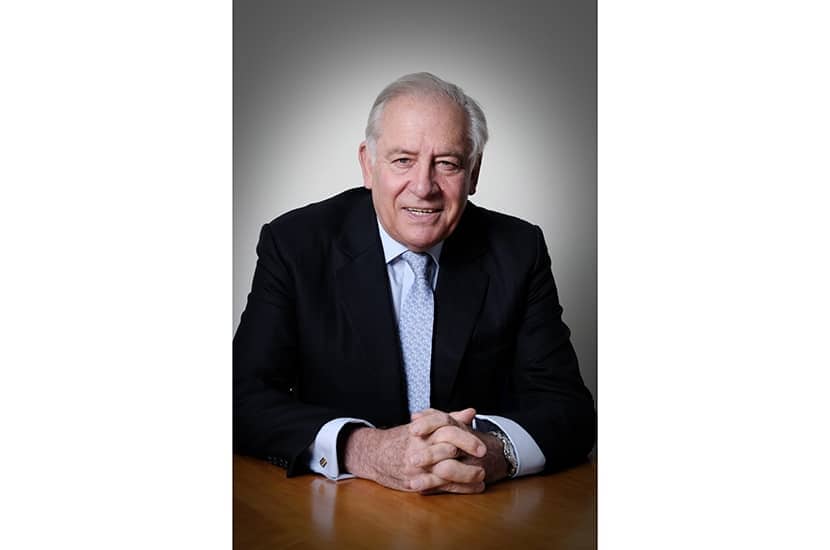A headline in the Mail on Sunday, taken up eagerly by the BBC’s Today programme, claimed recently: ‘The SAS is getting worried that not enough posh officers are applying for jobs.’ Having hooked those shocked by the thought that the SAS should draw such distinctions, as well as those appalled that oiks are applying at all, the piece actually went on to explain that one officer failed the selection because he ‘lacked the sophistication’ to be able to brief cabinet ministers on operations.
No lack of sophistication ever attached to Charles Guthrie. When, as head of school at Harrow, you’ve had tea with Winston Churchill in the headmaster’s study, planned the young Queen Elizabeth’s visit and then conducted her round the hill, a mere cabinet minister, or prime minister for that matter, is hardly going to faze you. Guthrie was an SAS captain at 27 and a squadron commander (major) at 29. He was also — he would say primarily — a guards officer. Urbanity was his trademark. This and formidable physical robustness combined to produce the idealised SAS officer, described in the MoS piece by one Hereford NCO as ‘confident, relaxed, bright and unflappable’.
‘That Colonel Guthrie, he’s going to the very top of the army’ predicted Margaret Thatcher in 1979
And yet when the time came and he was given the choice of command of the Welsh Guards or the 22nd Special Air Service Regiment, he chose the former. What followed was the classic route to the top in Cold War days: a stint in the military operations branch of the MoD, command of an armoured brigade in BAOR and then a division, then back to the MoD as assistant chief of the general staff — about which he writes nothing, saying it was ‘dull’ (he has a low boredom threshold) — followed by command of the 1st British Corps and then Nato’s Northern Army Group, afterwards becoming CGS (head of the army) in 1994, and finally, in 1997, chief of the defence staff. If he’d chosen to command 22 SAS instead, one suspects the route would have been different but the destination the same. Margaret Thatcher, after being briefed by him in South Armagh in 1979, said to her private secretary: ‘That Colonel Guthrie, he’s going to the very top of the army.’ (Full disclosure: I take pride that Mrs T shared my own view, my having first met him during that operational tour.)
Guthrie was sometimes viewed with suspicion in the army, however. He was thought to be accommodatingly ambitious, a ‘political general’. This he regards as facile. He is critical, for example, of Lord Dannatt’s injudiciousness with Labour ministers when CGS (as well as his subsequent agreement to be an adviser to David Cameron, and its implicit offer of a Tory peerage). But the complaints were not just that Guthrie was a political general, but ‘Tony’s general’. In 1997, in the dying days of John Major’s government, he and Blair met for breakfast at Claridge’s. (I’m pretty sure it was Guthrie’s choice of venue: home ground, rather than the terra incognita of Islington.) Blair astonished him when he said he thought the SAS numbered about 40,000. Guthrie told him to knock off two noughts. One of the reasons he was keen for a word before the election was to impress on Blair the need for a heavyweight defence secretary. Blair appointed George Robertson, who proved to be, by almost universal acclamation, one of the best since Denis Healey, although Guthrie is also warm in his praise of Michael Portillo, who preceded him.
The trouble was the chancellor, who wouldn’t fund Robertson’s defence review. Guthrie recounts his attempts to get Blair interested. ‘You’ll have to speak to Gordon’ was always the reply. Eventually he did. It was a fractious meeting. I gave a bowdlerised version of it in a piece I wrote for the Telegraph. Brown: ‘General, you think I know nothing about defence.’ Guthrie: ‘No, chancellor, I know you know nothing about defence.’ Guthrie’s memoir puts the record straight. Brown: ‘General, I do know a bit about defence, you know.’ Guthrie: ‘Chancellor, you know fuck all about defence.’
Guthrie didn’t get much extra funding. When Brown became PM, however, he approved funds for two aircraft carriers which were to be built in his next-door constituency, and which Guthrie scorns as terminally vulnerable ‘behemoths’.
The theme of these memoirs, from the soldier’s point of view, is that without a hinterland and self-mastery you’ll never amount to much. (And one gets the impression that Guthrie believes that too many senior officers today lack a decent hinterland.) The other is, perhaps, principled pragmatism. Guthrie, the last grandee CDS (and the first CDS to have served in the SAS), sees himself not as a political general but a strategic one. He certainly won his shooting wars — Bosnia, Kosovo, Sierra Leone — and he managed to steer Blair away from some unwinnable ventures. I calculate that if Marshal of the RAF Sir Peter Harding hadn’t had to resign after being caught with his pants down, which had the knock-on effect of Guthrie’s earlier than planned advancement to CGS and in turn to CDS, he would still have been in post on 9/11, and even perhaps in 2003. The outcome in Iraq would probably have been different, if only that our reputation wouldn’t have been trashed by Basra.
Others — Matthew Parris, probably, who described the army as a ‘self-basting mediocrity’, much to Guthrie’s discomfort — will find things to tilt at; but there is profound wisdom in these engaging memoirs, written with wry humour and a deceptively light touch.






Comments